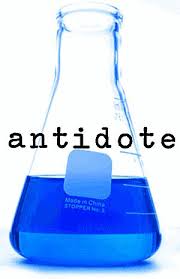记忆方法
1、anti- "against" + dot- "give" + -e.
2、字面意思为:given against. => given as a remedy(补救, 纠正). => a remedy against poison. => remedy counteracting poison.
3. anti- + -dote (谐音:毒他)。
2、字面意思为:given against. => given as a remedy(补救, 纠正). => a remedy against poison. => remedy counteracting poison.
3. anti- + -dote (谐音:毒他)。
中文词源
antidote 解毒剂
前缀anti-, 相对,相反。词根dot, 见donate.
英语词源
- antidote
-
antidote: see date
- antidote (n.)
- "remedy counteracting poison," 1510s (earlier in English as a Latin word), from Middle French antidot and directly from Latin antidotum "a remedy against poison," from Greek antidoton "given as a remedy," literally "given against," verbal adjective of antididonai "give in return," from anti- "against" + didonai "to give" (see date (n.1)). Compare Middle English antidotarie "treatise on drugs or medicines" (c. 1400).
权威例句
- 1. Massage is a wonderful antidote to stress.
- 按摩是舒缓压力的一剂妙方。
- 2. There is no known antidote to the poison.
- 这种毒的解药尚未发现。
- 3. Quinine is a natural antidote for this fever.
- 奎宁是治疗这种热病的天然药.
- 4. There is no known antidote for this poison.
- 这种毒药没有解药.
- 5. Hard work is the best antidote to mischief.
- 繁忙的工作是防止为非作歹的最好方法.
